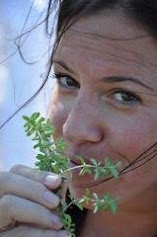As a food and travel writer, I firmly believe if you’re going to blog or write about restaurants, you need to spend some time working in one to fully understand how the business works. It’s one thing to sit at your perfectly set table on the receiving end of (hopefully) delicious food and fine tuned service, but an entirely different thing to understand how many hands are involved in making that meal appear in the minutes after you say, “I’d like the steak, please - medium rare.”
After my first week at Quinta Das Abelhas, I feel that anyone who eats – period – should spend some time WWOOFing (World Wide Opportunities on Organic Farms), or at the very least, on a small, organic farm. I’ve volunteered in Seattle at Marra Farm, a four acre plot within the city limits that produces more than 16,000 pounds of food for the local community. But dropping by to play urban farmer for an afternoon is drastically different from living the day-to-day reality of what goes into making a self-sufficient farm function.
My duties at Quinta Das Abelhas ran the gamut from harvesting basketfuls of vegetables from the gardens and readying beds for the winter with fertilizer and seeds to making quince jelly with fresh picked fruit, helping to remove mud from a trench after a heavy rainfall to building a stone wall. After more than a decade of declaring defeat when working with yeast, Sophie even helped me bake my first successful loaf of bread. The list of what I’m learning about self-sufficiency is endless. The beauty of volunteering in this kind of environment is that there is always something to do, the work is rarely repetitive and it’s fun. I love, love, love being here.
I decided to WWOOF with Quinta Das Abelhas because I try to eat locally and seasonally whenever possible and take great interest in knowing where food comes from. Portugal is a far distance from Seattle (5,836 miles each way to be exact – I have a lot of carbon footprint making up to do), it’s a place I’ve wanted to visit for a long time and got a really good feeling about Andy and Sophie from their website and blog. (I also saw a photo of a gigantic zucchini a friend’s father in Lisbon had grown and had a feeling that people around these parts knew a thing or two about farming.) My gut was spot on. I know a lot of people who’d pay large sums of money for this kind of experience and to achieve the peace I’ve experienced here.
For starters, the property is stunningly beautiful. So even when you’re shoveling manure, you can’t help but have repeated “ah ha” moments. I’m no skilled farm hand, but even so, you feel like you’re playing some small part in the success of a small, family run operation and that feels good. It takes a lot of hands, heart and sweat to make this place run. For all of your hard work, volunteers are rewarded with amazing meals made by Andy and some of the sweetest slumbers ever – I’ve made no secret about how much I love living in my comfy, cozy yurt. After volunteering with four other organizations over the past four months, working for kind people who truly care makes a huge difference. (That’s probably the number one thing I’m grateful for.) Living at Quinta Das Abelhas is a simpler way of life than I’m accustomed to, but it imparts such incredible feelings of calm and satisfaction, that I’m already scheming ways to adopt some of these aspects when I resume my usual urban routine.
My time at Quinta Das Abelhas reiterated something I feel strongly about: More small farms means more locally produced food, which makes the planet happy. Would you rather be on a first name basis with the farmers who grow your food or do you prefer food that has wracked up thousands of airline miles to make it to your plate? A silly question, really. In a perfect world, less people would eat food produced in massive industrial farms and far off places and more would support the individual people who put so much care into making sure our food is safe, healthy and delicious. WWOOF and you’ll understand why.
Subscribe to:
Post Comments (Atom)











2 comments:
Nice blog. It's good to be globally connected and to know that the process of connecting the eater of the food with the producer is actually a worldwide network of people with similar aspirations. The corporate model of globalism is obviously not sustainable. Sooner or later the corporate globe-ocracy will collapse of its own top heaviness. It's already happening. When that happens it's a good idea to have a viable way of connecting producers and users already in place. The fact that the quality and taste of locally grown food is vastly superior to what the global corporate model provides is another bonus. Hurray! It's not just a choice it's a mandate for the survival of the species.
Thank you, Steve for your insightful and spot on comment. I agree with you wholeheartedly - while eating locally does provide a warm and fuzzy, feel good sense of community, fundamentally, it's imperative for our long-term survival/success. People are taking notice around the globe - it's just that MORE people need to take notice and pull themselves out of a state of denial.
Post a Comment